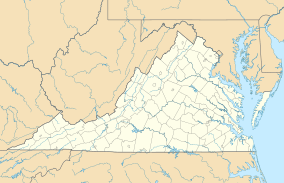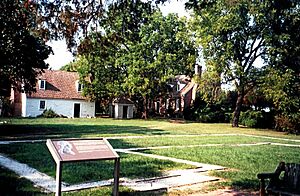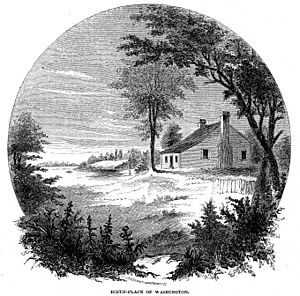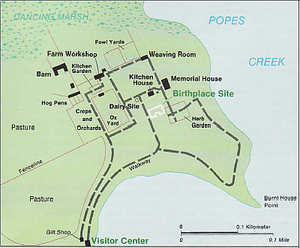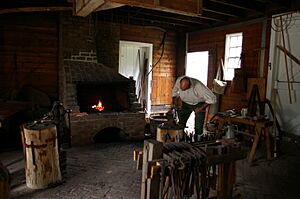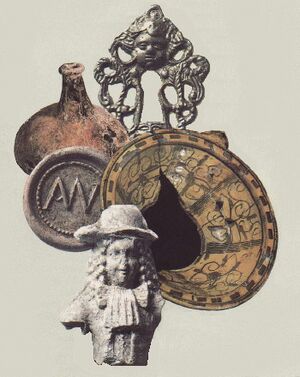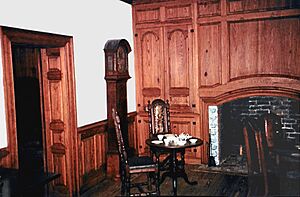George Washington Birthplace National Monument facts for kids
Quick facts for kids George Washington Birthplace National Monument |
|
|---|---|
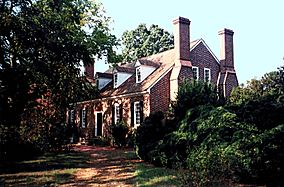 |
|
| Location | Westmoreland County, Virginia, U.S. |
| Nearest city | Colonial Beach, Virginia, U.S. |
| Area | 661.7 acres (267.8 ha) |
| Established | January 23, 1930 |
| Visitors | 130,647 (in 2011) |
| Governing body | National Park Service |
| Website | George Washington Birthplace National Monument |
|
George Washington Birthplace National Monument
|
|
| NRHP reference No. | 66000850 |
| Significant dates | |
| Added to NRHP | October 15, 1966 |
The George Washington Birthplace National Monument is a special place in Westmoreland County, Virginia. It sits where Popes Creek meets the Potomac River. This monument celebrates the exact spot where George Washington was born. He was a Founding Father and the first President of the United States. George Washington was born here on February 22, 1732. He lived in this home until he was three years old. He also returned to live here again as a teenager.
Contents
A Look Back in Time
The Washington Family Home
George Washington's great-grandfather, John Washington, started this plantation in 1657. It was first located on Bridges Creek. Later, the family bought more land towards Popes Creek.
The first part of the house was built before 1718. George's father made it bigger between 1722 and 1726. By the mid-1770s, it had ten rooms and was called "Wakefield." George Washington himself called it "the ancient mansion seat" in 1792. Sadly, this house was destroyed by fire and a flood on Christmas Day in 1779. It was never rebuilt.
George Washington was born in this house on February 22, 1732. The family's burial ground has 32 graves. These include George's father, grandfather, and great-grandfather.
Washington's father owned enslaved people. They worked on his farms, growing crops like tobacco. This was a common practice for plantation owners at that time.
Preserving History: The 1800s
In 1858, the state of Virginia bought the property. They wanted to protect the homesite and cemetery. After the Civil War, Virginia gave the land to the United States government in 1882.
Building a Memorial: The 1900s
A group called the Wakefield National Memorial Association formed in 1923. Their goal was to bring the property back to life. In 1930, the U.S. Congress made the grounds a National Monument. The Wakefield Association received money from John D. Rockefeller Jr. in 1931. This helped them buy and give about 394 acres (1.6 km2) of land to the government.
No one knows exactly what the original Washington family home looked like. So, a Memorial House was built in 1931. It was designed by Edward W. Donn Jr. to look like other homes from that time. The actual spot where George Washington was born is next to this memorial house. Its foundation is marked on the ground with crushed oyster shells.
The Memorial House shows what a typical tobacco plantation home looked like. It was built with bricks made from local clay. Inside, it has a central hallway and four rooms on each floor. These rooms are filled with furniture from the 1730s to 1750s. One special item is an 18th-century tea table. Many believe it was in the original Washington house. Most other items are over 200 years old.
At the entrance to the monument, there is a tall, thin monument called a Memorial Shaft. It is made of Vermont marble. This shaft is a one-tenth scale copy of the famous Washington Monument in Washington, D.C.. The National Park Service now takes care of the park.
The park and Memorial House opened in 1932. This was the 200th anniversary of George Washington's birth.
What You Can See Today: The 2000s
Today, the monument helps people learn about history. Visitors can explore the historic birthplace area and the Kitchen House. There are also hiking trails and picnic spots. In the Kitchen House, people dressed in old-fashioned clothes show how to make candles and soap.
A colonial herb and flower garden has plants common in Washington's time. You can see thyme, sage, basil, and flowers like hollyhocks and roses. The Colonial Living Farm has a barn and animals. It grows crops using 18th-century farming methods.
You can also visit the Washington family Burial Ground. It holds the graves of 32 family members. These include George Washington's father, grandfather, and great-grandfather. You can see copies of two original gravestones. There are also five memorial tablets placed there in the 1930s.
The Visitors' Center has items found from the burned-down Washington house. These include a bowl, a clay figurine, and a wine bottle. A 15-minute film about Washington family life is also shown there.
How to Visit
The George Washington Birthplace National Monument is about 38 miles (61 km) east of Fredericksburg, Virginia. It is located on the Northern Neck. You can get there by taking VA Route 204. This road connects to VA State Route 3.
See also
- List of national monuments of the United States
- List of residences of presidents of the United States
- Northern Neck George Washington Birthplace AVA
- Washington's Birthday
- Montross, Virginia
- Stratford Hall Plantation
- State Route 204, the access road to the site from State Route 3
 | Victor J. Glover |
 | Yvonne Cagle |
 | Jeanette Epps |
 | Bernard A. Harris Jr. |


